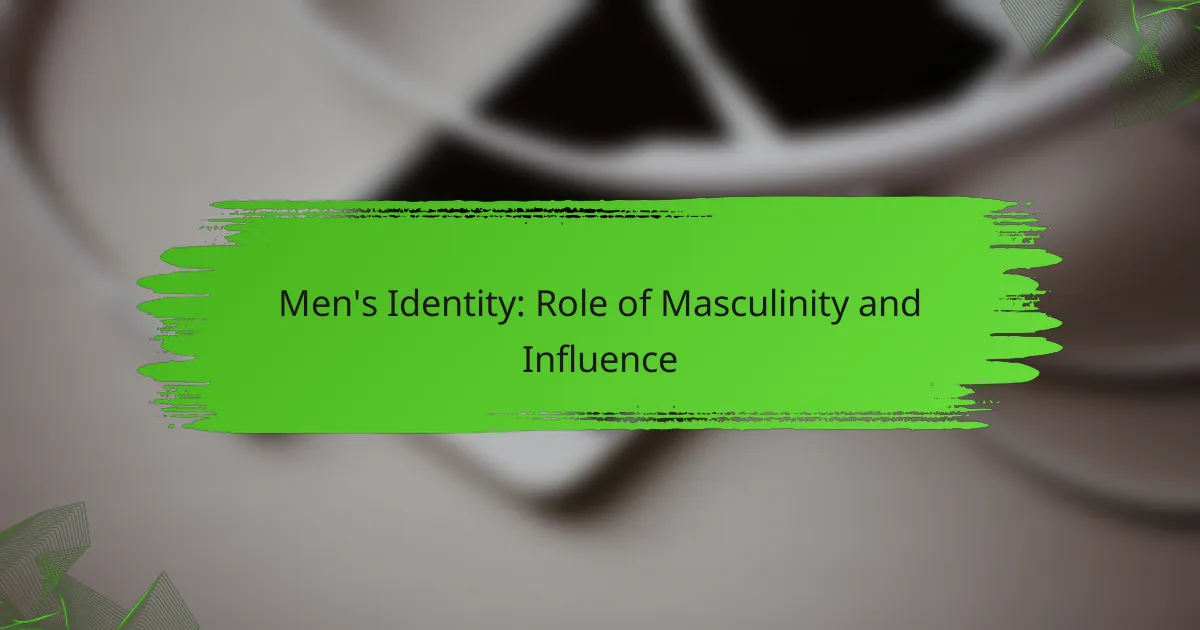The landscape of masculinity is undergoing a profound transformation, marked by a growing recognition of emotional intelligence and inclusivity. As societal expectations evolve, men are increasingly challenged to redefine their identities and embrace a more flexible understanding of gender roles. This shift not only promotes emotional openness but also fosters healthier relationships and community support among men.
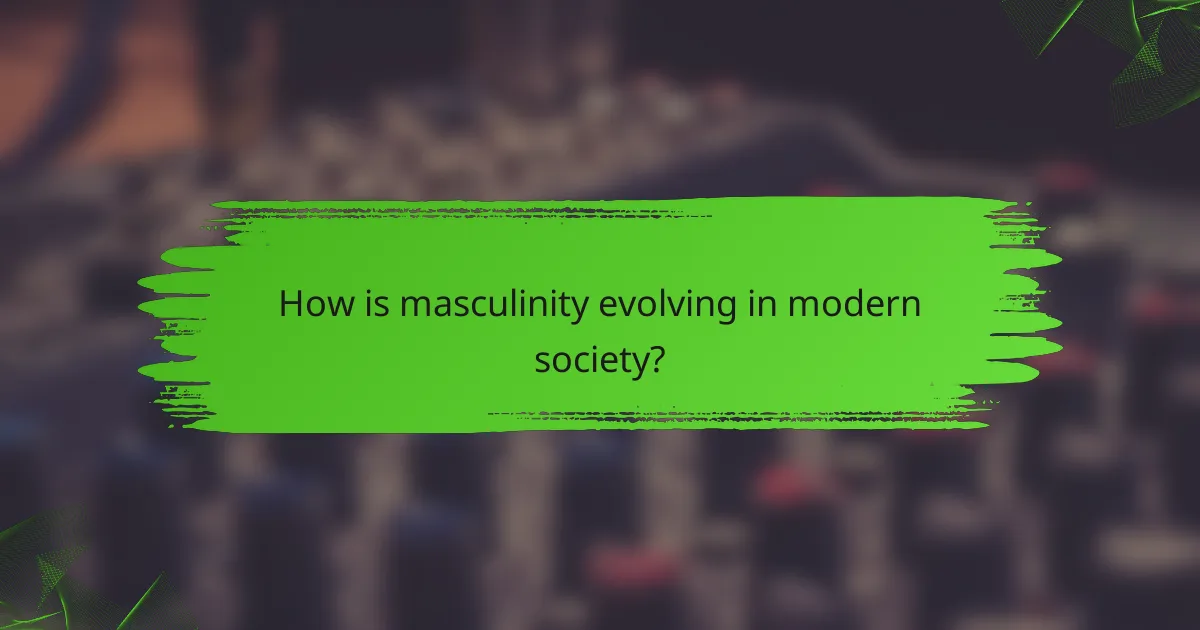
How is masculinity evolving in modern society?
Masculinity is evolving significantly in modern society, with a growing emphasis on emotional intelligence, inclusivity, and flexibility in gender roles. This shift reflects broader cultural changes that challenge traditional notions of what it means to be a man.
Shift towards emotional expression
The shift towards emotional expression in masculinity encourages men to openly share their feelings and vulnerabilities. This change helps to dismantle the stereotype that men must be stoic and unemotional, promoting mental health and well-being.
Men are increasingly participating in discussions about mental health, seeking therapy, and engaging in support groups. This trend is evident in various communities, where men are encouraged to express emotions without fear of judgment.
Redefinition of gender roles
The redefinition of gender roles is reshaping expectations around masculinity, allowing men to take on caregiving and domestic responsibilities traditionally associated with women. This evolution fosters a more equitable distribution of household duties and parenting roles.
As societal norms shift, men are more frequently seen in roles such as stay-at-home dads or primary caregivers, which promotes a more balanced family dynamic. This change not only benefits families but also challenges outdated stereotypes about masculinity.
Impact of social media
Social media plays a crucial role in the evolution of masculinity by providing platforms for diverse voices and experiences. Men are using these platforms to share their stories, challenge stereotypes, and connect with others who share similar experiences.
Online communities often promote positive masculinity, encouraging discussions around vulnerability, mental health, and emotional expression. However, social media can also perpetuate unrealistic standards, so men must navigate these platforms mindfully to foster healthy self-images.
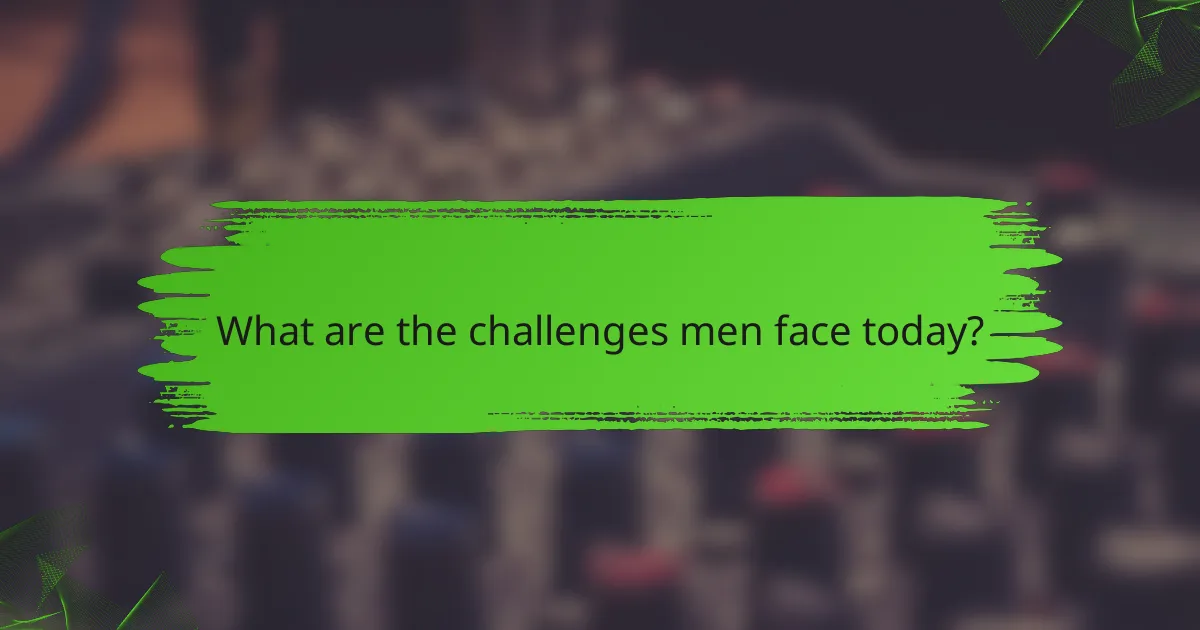
What are the challenges men face today?
Men today encounter various challenges that affect their identity, mental well-being, and daily lives. These issues stem from societal expectations, personal struggles, and the evolving landscape of gender roles.
Pressure to conform to traditional norms
Many men feel compelled to adhere to traditional masculinity standards, which often emphasize strength, stoicism, and dominance. This pressure can lead to feelings of inadequacy when they do not meet these expectations.
As society evolves, the definition of masculinity is shifting, yet many men still grapple with the fear of being perceived as weak or less masculine. This internal conflict can hinder their ability to express emotions or seek help when needed.
Struggles with mental health
Men often face significant mental health challenges, yet societal stigma can prevent them from seeking help. Conditions such as depression and anxiety are prevalent, but many men may feel that admitting to these struggles undermines their masculinity.
It is crucial for men to recognize that mental health is just as important as physical health. Seeking support from friends, family, or professionals can lead to improved well-being and a better quality of life.
Work-life balance issues
Achieving a healthy work-life balance is a common struggle for men, particularly in high-pressure jobs. The expectation to be the primary breadwinner can lead to long hours and stress, impacting personal relationships and overall happiness.
To improve work-life balance, men should set clear boundaries between work and personal time. Prioritizing family time, hobbies, and self-care can help mitigate stress and enhance overall life satisfaction.
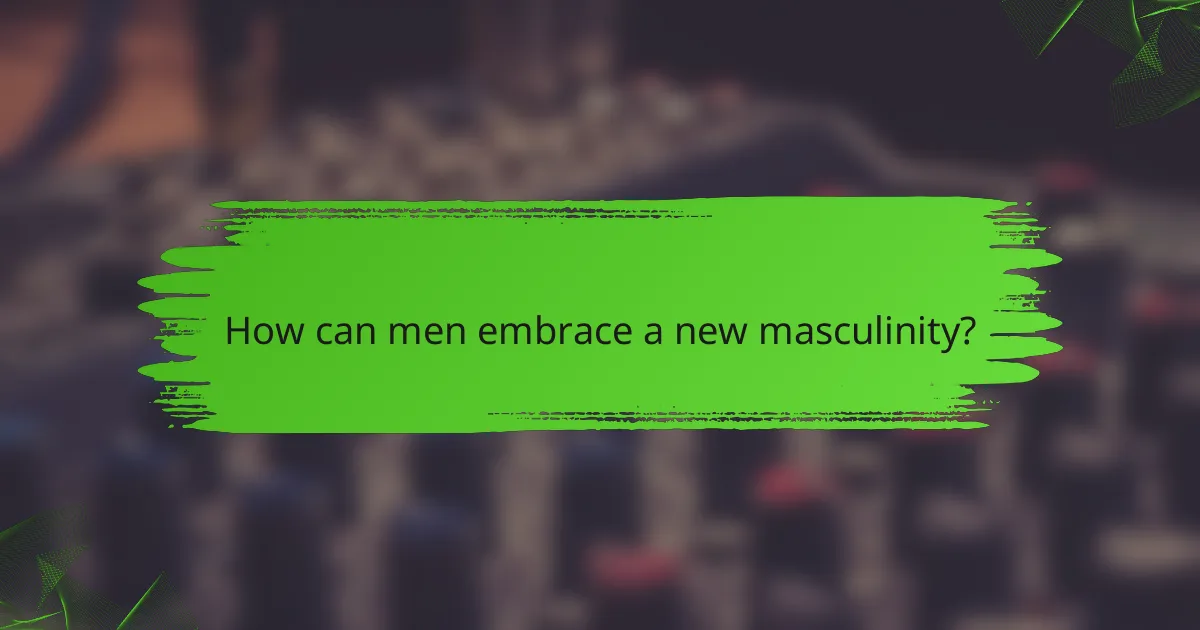
How can men embrace a new masculinity?
Men can embrace a new masculinity by redefining traditional norms to include emotional openness, community support, and healthy relationships. This shift encourages men to express their feelings and connect with others in meaningful ways.
Practicing vulnerability
Practicing vulnerability involves being open about emotions and experiences, which can foster deeper connections with others. Men can start by sharing their feelings with trusted friends or family members, creating a safe space for dialogue.
To cultivate vulnerability, consider journaling or engaging in activities that promote self-reflection. This can help men articulate their thoughts and feelings more clearly, making it easier to communicate with others.
Engaging in supportive communities
Engaging in supportive communities allows men to connect with others who share similar values and experiences. These communities can be found in various forms, such as men’s groups, online forums, or local clubs focused on personal growth.
Joining such communities can provide a sense of belonging and encouragement, helping men to navigate their emotional landscapes. Look for groups that emphasize inclusivity and support, which can enhance personal development.
Promoting healthy relationships
Promoting healthy relationships is essential for fostering mutual respect and understanding. Men should focus on effective communication, active listening, and empathy to strengthen their connections with partners, friends, and family.
To enhance relationship health, consider setting boundaries and discussing needs openly. Regular check-ins with loved ones can help maintain a supportive environment where everyone feels valued and heard.

What resources are available for men?
Men today have access to a variety of resources aimed at exploring and redefining masculinity. These resources include books, workshops, and online support groups that provide insights and foster discussions around modern male identity.
Books on modern masculinity
Books addressing modern masculinity cover a range of topics from emotional intelligence to societal expectations. Titles like “The Mask of Masculinity” by Lewis Howes and “Man Enough” by Justin Baldoni offer perspectives on vulnerability and authenticity.
When selecting a book, consider your specific interests—whether it’s personal growth, relationships, or societal critique. Many of these books include practical exercises and reflections to help readers apply concepts to their lives.
Workshops and seminars
Workshops and seminars provide interactive environments for men to engage with topics of masculinity. These events often include discussions, role-playing, and group activities that encourage participants to share experiences and learn from one another.
Look for local community centers or organizations that host these events, which may vary in length from a few hours to several days. Some workshops may focus on specific themes, such as fatherhood or mental health, allowing for deeper exploration of particular issues.
Online support groups
Online support groups offer a convenient way for men to connect and discuss their experiences with masculinity. Platforms like Facebook and Reddit host various groups where members can share stories, seek advice, and provide support in a safe space.
When joining an online group, ensure it aligns with your values and goals. Active participation can enhance your experience, but it’s also important to respect others’ privacy and boundaries. Look for groups that have clear guidelines to foster a positive environment.
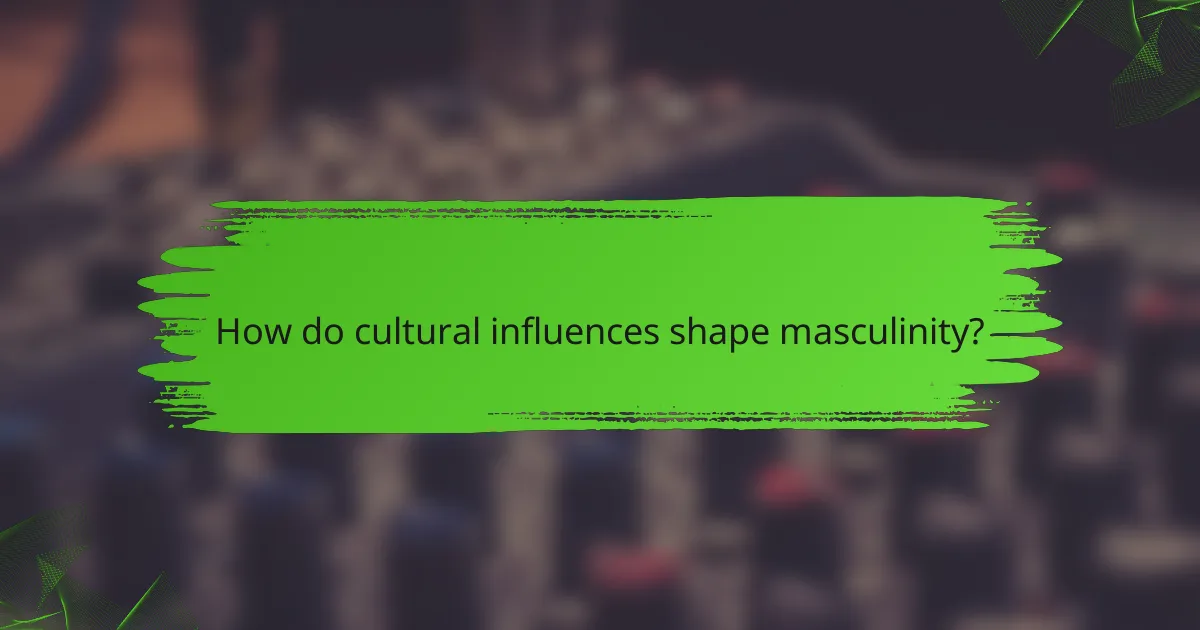
How do cultural influences shape masculinity?
Cultural influences significantly shape masculinity by defining societal expectations and norms surrounding male behavior. These influences can vary widely across different cultures and time periods, impacting how men perceive themselves and their roles in society.
Media representation
Media representation plays a crucial role in shaping perceptions of masculinity. Television shows, movies, and advertisements often depict men in specific roles, such as the strong protector or the emotionally stoic figure, which can reinforce traditional masculine ideals. Over time, these portrayals can influence how men and boys understand their own identities and behaviors.
In recent years, there has been a shift towards more diverse representations of masculinity, showcasing vulnerability, emotional depth, and varied lifestyles. This evolution encourages a broader understanding of what it means to be masculine, allowing men to embrace traits that were previously deemed unmasculine.
Influence of popular figures
Popular figures, including athletes, actors, and influencers, significantly impact societal views on masculinity. Their public personas and behaviors can either challenge or reinforce traditional masculine norms. For example, athletes who openly discuss mental health issues can help normalize vulnerability among men.
Moreover, the actions and statements of these figures can inspire younger generations to redefine masculinity. When influential men advocate for equality, emotional expression, or reject toxic behaviors, they contribute to a cultural shift that promotes a healthier understanding of masculinity.



